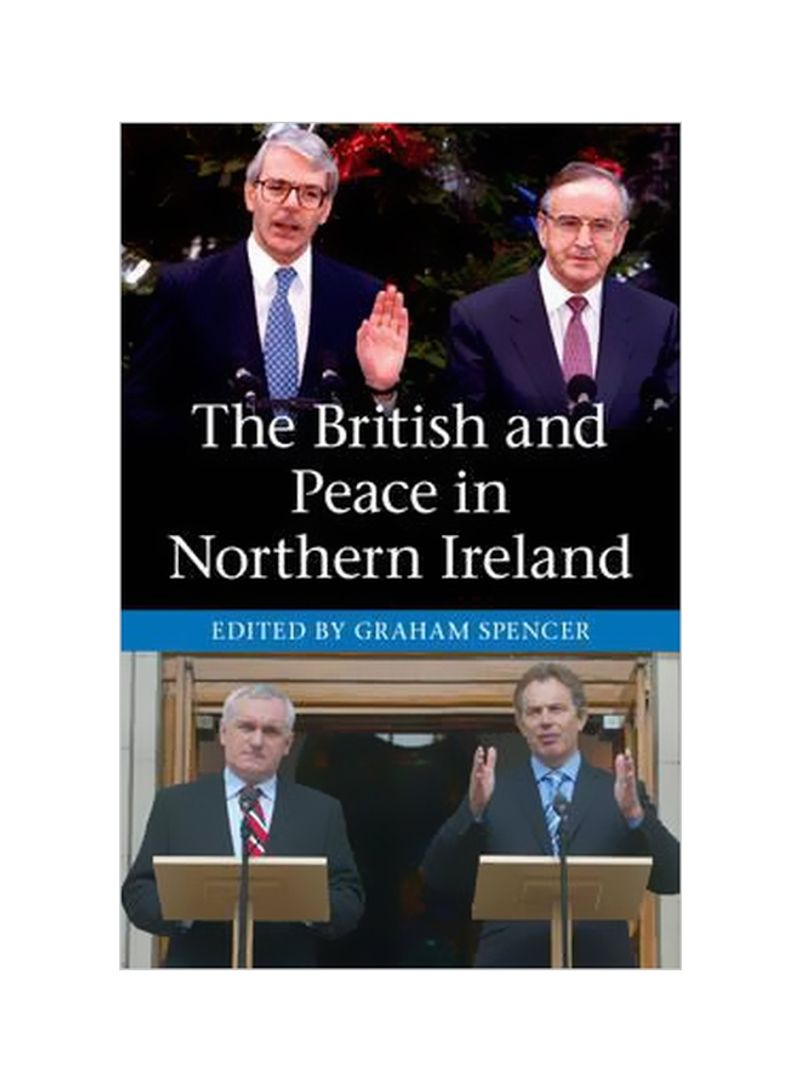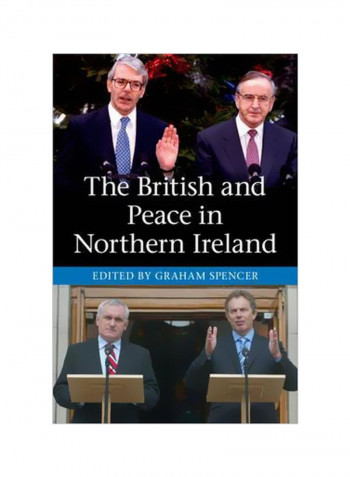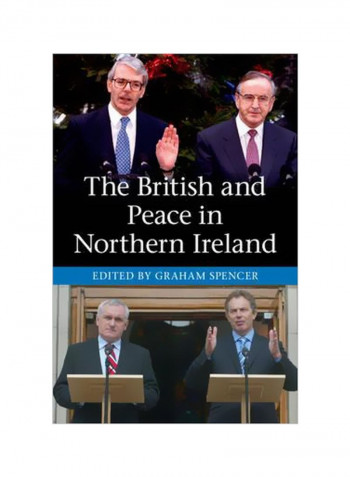The British And Peace In Northern Ireland Paperback
Recommend
Sort by
Rating
Date
Specifications
Author 1
Graham Spencer
Book Description
How did the British Government and Civil Service shape the Northern Ireland peace process? What kind of tensions and debates were being played out between the two governments and the various parties in Northern Ireland? Addressing texts, negotiations, dialogues, space, leverage, strategy, ambiguity, interpersonal relations and convergence, this is the first volume to examine how senior British officials and civil servants worked to bring about power-sharing in Northern Ireland. With a unique format featuring self-authored inside accounts and interview testimonies, it considers a spectrum of areas and issues that came into play during the dialogues and negotiations that led to the 1998 Good Friday Agreement and political accommodation in Northern Ireland. This book provides a compelling insight into what actually happened inside the negotiating room and how the British tried to shape the course of negotiations.
ISBN-10
1107617502
ISBN-13
9781107617506
Language
English
Publisher
Cambridge University Press
Publication Date
31-Mar-15
Number of Pages
374
About the Author
Graham Spencer is Reader in Politics, Conflict and the Media at the University of Portsmouth, Distinguished Senior Research Fellow in the Edward M. Kennedy Institute for Conflict Intervention at the National University of Ireland, Maynooth and Honorary Senior Research Fellow in the Department of Politics at the University of Liverpool. His books include From Armed Struggle to Political Struggle: Republican Tradition and Transformation in Northern Ireland (2015), Protestant Identity and Peace in Northern Ireland (2012), The Media and Peace (2008), The State of Loyalism in Northern Ireland (2008), Omagh: Voices of Loss (2005), Ulster Loyalism After the Good Friday Agreement (editor with James W. McAuley, 2011) and Forgiving and Remembering in Northern Ireland (editor, 2011). He is also a Fellow of the Royal Society of Arts. His research interests include conflict transformation, political negotiation and communication, identities in conflict and reconciliation.
Editorial Review
This book is an invaluable addition to examining what happened 'behind the scenes' at governmental level in the peace process. Graham Spencer has done a great service in helping us to understand the decision-making processes that went on amongst senior British civil servants and officials and this combination of authored chapters and penetrating interviews provides a wide-ranging analysis of tensions and problems that had to be dealt with before political agreement could be reached. There are many lessons to be found about negotiation in this illuminating and important study and we should thank Graham Spencer for that.' Bertie Ahern, Taoiseach of Ireland, 1997-28 'Until this unique book was written most people outside the peace process will not have been aware of the key role of senior British civil servants. Let me be quite clear, they were critical to its success. Many another peace process has failed because of the absence of such a remarkable cadre of people. Insiders to the Process know every one of the contributors and will immediately reach for their accounts of those times. Others who really want to know the story could not do better than follow their lead.' John, Lord Alderdice, FRCPsych 'In this valuable addition to the literature of conflict resolution we are brought right into the innards of the Northern Ireland peace process by people who grappled with it for most of their working lives. These are not the bland views from the bridge of the statesmen's memoirs, but tales told in the engine-room - of mess and dirt and doubt and compromise, of sharp changes in course, of mixed signals and messages misinterpreted, the very dynamics of conflict resolution as seen by the attendant mechanics. What we learn is that conflict resolution is a long-term business, requiring trust to be built between the most unlikely people, and a willingness, eventually, to talk to the people who are actually fighting.' Dr Maurice Hayes, former Independent Senator, Seanad Eireann, 1997-27, Northern Ireland Ombudsman and Boundary Commissioner, and voted European Person of the Year in 23 'The British and Peace in Northern Ireland is an indispensable book for any scholar examining how the peace process was constructed in the region. Graham Spencer has assembled the frank thoughts of a formidable cast of policy-makers to explain the evolution of British thinking on Northern Ireland and how this translated into the political frameworks which underpinned the onset of relative peace. Participants chronicle the 'treading on eggshells' and regular frustrations of dealing with rival unionist and national political actors in inching towards desired British goals. This is the authentic voice of those who shaped British and Irish history at a crucial time and is a 'must-read' volume.' Jon Tonge, University of Liverpool "This book is an invaluable addition to examining what happened 'behind the scenes' at governmental level in the peace process. Graham Spencer has done a great service in helping us to understand the decision-making processes that went on amongst senior British civil servants and officials and this combination of authored chapters and penetrating interviews provides a wide-ranging analysis of tensions and problems that had to be dealt with before political agreement could be reached. There are many lessons to be found about negotiation in this illuminating and important study and we should thank Graham Spencer for that." Bertie Ahern, Taoiseach of Ireland, 1997-28 "Until this unique book was written most people outside the peace process will not have been aware of the key role of senior British civil servants. Let me be quite clear, they were critical to its success. Many another peace process has failed because of the absence of such a remarkable cadre of people. Insiders to the Process know every one of the contributors and will immediately reach for their accounts of those times. Others who really want to know the story could not do better than follow their lead." John, Lord Alderdice, FRCPsych "In this valuable addition to the literature of conflict resolution we are brought right into the innards of the Northern Ireland peace process by people who grappled with it for most of their working lives. These are not the bland views from the bridge of the statesmen's memoirs, but tales told in the engine-room - of mess and dirt and doubt and compromise, of sharp changes in course, of mixed signals and messages misinterpreted, the very dynamics of conflict resolution as seen by the attendant mechanics. What we learn is that conflict resolution is a long-term business, requiring trust to be built between the most unlikely people, and a willingness, eventually, to talk to the people who are actually fighting." Dr Maurice Hayes, former Independent Senator, Seanad Eireann, 1997-27, Northern Ireland Ombudsman and Boundary Commissioner, and voted European Person of the Year in 23 "The British and Peace in Northern Ireland is an indispensable book for any scholar examining how the peace process was constructed in the region. Graham Spencer has assembled the frank thoughts of a formidable cast of policy-makers to explain the evolution of British thinking on Northern Ireland and how this translated into the political frameworks which underpinned the onset of relative peace. Participants chronicle the "treading on eggshells" and regular frustrations of dealing with rival unionist and national political actors in inching towards desired British goals. This is the authentic voice of those who shaped British and Irish history at a crucial time and is a "must-read" volume." Jon Tonge, University of Liverpool



